#but being half-muppet just gives you an existential crisis
Text
I'm not apologizing.
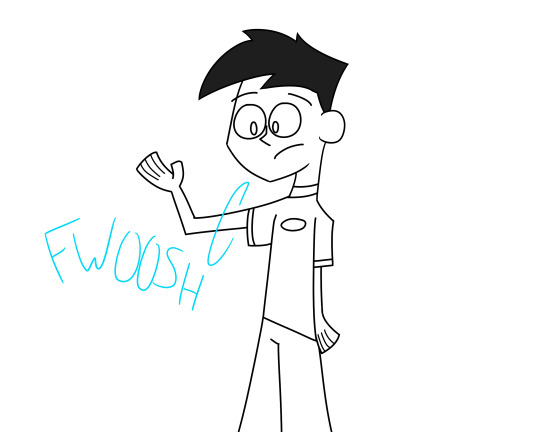
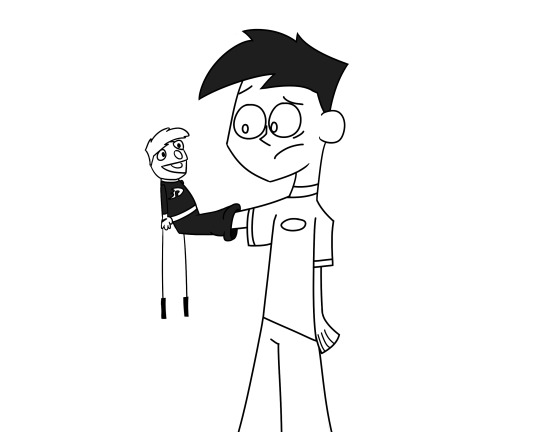
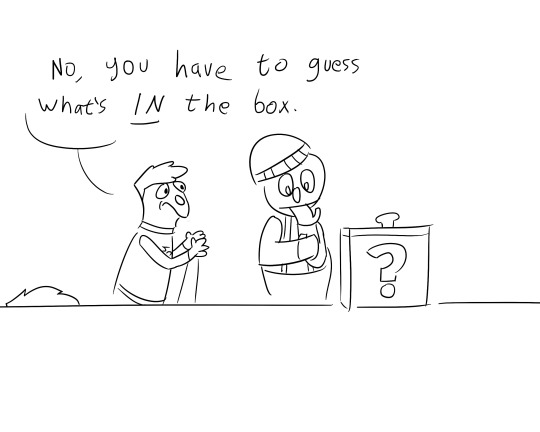

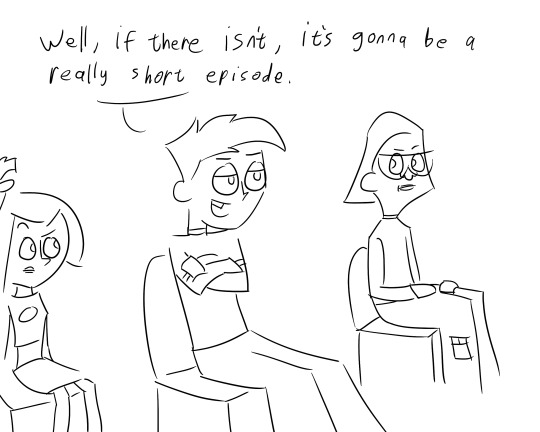
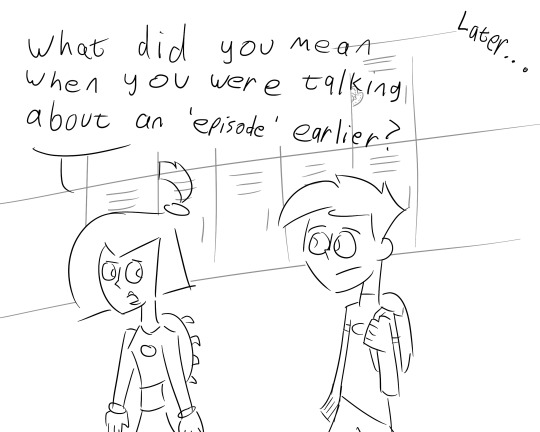


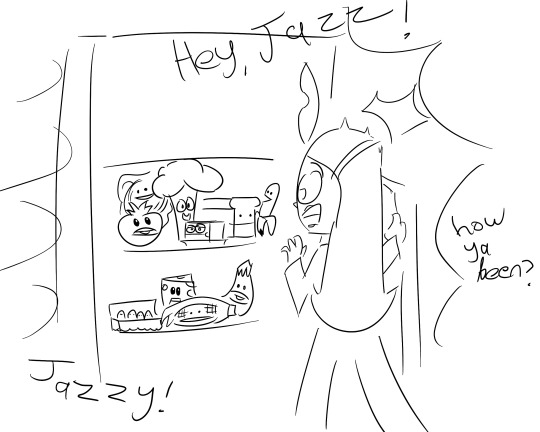

@ghostsray So, about that muppet AU...
#danny phantom#art#my art#the muppets#muppet au#dp au#danny fenton#box ghost#mr lancer#sam manson#tucker foley#jazz fenton#this au is ridiculous but i came up with ideas#the ghost 'fights' are just skits#no it's not a cookie#muppets have the ability to break the fourth wall#but being half-muppet just gives you an existential crisis#how do i draw tucker
86 notes
·
View notes
Text
The Dreaming issue 16
Okay, Simon. A Night Hag. Good for you in finally explaining what Dora is over a year and a half after you start! FINALLY!
Told you it would be kind of anti-climatic... Actually, I’m kind of relieved. I thought it might end up being ridiculously big. It makes sense but that really, really didn’t need to be a mystery / surprise. In fact that’s like announcing “Dora is humanoid.” It’s like “...And? Water is wet now?” This was your big build up? The reveal that the monster that is always hungry and horny ...is a Night Hag? That’s like trying to make a Marvel twist that Malekith is a Drow.
I shouldn’t complain. This makes perfect sense. I’m just annoyed at the long, drawn out “GUESS DORA’S AMAZING SECRET!” You might as well have said the secret is “She has weird ears.”
It makes sense. And of course she was the accidental catalyst and inspiration for Hyperion’s scheme. Thanks, Dora...
This really did not need to be drawn out as long as it was.
Though if we really nitpick here, Eve sort of fit the Night Hag Role when she was haunting the dying Matthew Cable before he became Morpheus’ raven... I know she’s technically not a Night Hag but she pretty much served that purpose during her appearance in Swamp Thing in the issue where Matthew dies (and ultimately becomes Morpheus’ raven).
Now let’s pause a moment. The records of Morpheus’ capture WERE SOLD AT AN ESTATE (Garage) SALE IN 2007!?! What the Hell type of garage sales do you go to!??
Thanks, Paul... Or is Paul dead? I figured Alexander Burgess should have passed away by now but who is running the estate that you can just buy records of Morpheus’ capture?!
Also do- not- compare- the Lord of Dreams to an app!

I have to admit this issue was actually kind of interesting (Finally! It hasn’t been intriguing since issue 7. That was the first and last truly interesting issue and even then it’s implied Daniel killed a bunch of men... for just catcalling...). However if that was supposed to be a “Surprise” twist that the “consciousness” uploaded in the house from The Dreaming was Cain, I figured that out the first page it appeared. Thank you for not trying to stretch out that “Surprise” reveal.
From the get-go I think Simon has had a pretty loose idea of what Cain actually is, confusing his compulsion to kill Abel with a generic “Kill everything!” Once you get the hang of his misunderstanding of what Cain is, it’s easy to spot Cain even when he’s a disembodied voice. Oh, well. Still better than Caitlin R. Kiernan deciding that Cain was a misogynist. Weirdly though, she wrote him okay in the volume 2 version of The House of Mystery. Just not the first version of The Dreaming.
Cain’s not that hard of a character to figure out, guys. He’s essentially The Crypt Keeper with an obsession with the concept of mystery, a love of his own spooky old house, and a fratricidal compulsion with some Vincent Price-isms. He’s not the Crazy Harry Muppet.
Paul Dini figured him out well enough to use him accurately in the kids show Justice League: Action for the episode Trick or Threat. But then again Paul Dini is a master. Cain’s been so badly mishandled in two versions of The Dreaming that I’m starting to seriously pity the bastard.
No joke, I had a weird dream back in early March of 2018. I might have posted about it back then. I’m just too lazy to try to find it. In the dream an old man that I thought was Alexander Burgess was trying to set right a terrible wrong he had done to The Dreaming. There was an elaborate pentacle on a floor. Don’t you just love when your mind gives you half-assed spoilers? Well, I was partly right... Thanks for the spoilers, Dream King. Too bad I misinterpreted who the bald old man was.
Dora has found Hyperion Keter, the man behind this madness. Apparently she, as a Night Hag, was feeding on him in his nightmares in the early 90s. He confronted her, told her that she was not real, and it caused her to fall into an existential crisis where Morpheus found her and took pity on her.
Hyperion (Who is essentially a Steve Jobs type) came up with a mad scheme to save humanity from it’s own fear, superstition, and cruelties in the name of religion by destroying all of that- our faith, our beliefs, our myths and legends and superstitions, through our very dreams. He created an AI that doesn’t know what their true purpose is. The AI wants to be good and benign but is designed to destroy belief. Daniel was branded with a powerful geas tattoo placed on him by his lover (and great-niece) Ivy, who was controlled by the occultists. Daniel came to Hyperion and showed him what his madness would do if successful so Hyperion decided to try to stop it but his own people turned against him. Weak and dying from cancer, Hyperion was helpless.
Cain’s “essence” was uploaded into a... Cloud server... And is now haunting the mansion where poor Hyperion lay dying and remorseful.
Sixteen issues and this whole thing feels like it could have been told in three or four issues... Ah, well. At least it’s moving now... And here I thought issue 16 would just be Lucien trying to kill himself. I guess that’s issue 17?
I don’t know why I’m so bitter. Maybe it’s because I know this could have been so much better. It had such potential. My subconscious gave me the loose version of the plot back in 2018. I saw the good parts.
Anyway, for all my bitching this was probably the best issue since issue 7. I liked issue 7, just not that weird part of Daniel apparently drowning those men for catcalling and Ivy “devastated” when Daniel had refused to be tattooed by her. And this was before the occultists controlled her. Here’s a little exercise. If it’s not okay for a man to do that to a woman, it’s also not okay for a woman to do that to a man. Respect your lover’s autonomy and never try to guilt someone into body modification, no matter what your profession is. No means no, bitch.
I AM amused, however, by the fact that the binding sigil- the geas tattoo holding poor Daniel is a cross between a Solomonic figure and a dream catcher. You trapped Dream ...with a Dream Catcher...
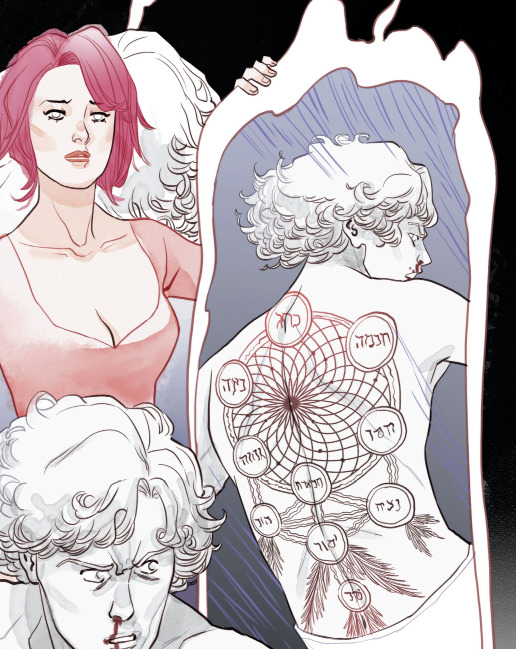
Anyway, for the first time since issue 7 we actually got answers. There was actual plot progression. And I actually give a damn about what’s going on.
Issue 16... is actually a decent read. Not bad. Definitely a lot more satisfying than most of The Dreaming so far.
I still miss the Vertigo logo...

Now for the next concern...
So… Who is ready for the (As of right now) “implied” death of Lucien next month? If this happens there will be no salvaging this version of The Dreaming. It’s just Caitlin R. Kiernan’s version in a new wrapper and changing which Dreaming character dies for a cheap knock-off of The Wake.
Please, let this implication be wrong…
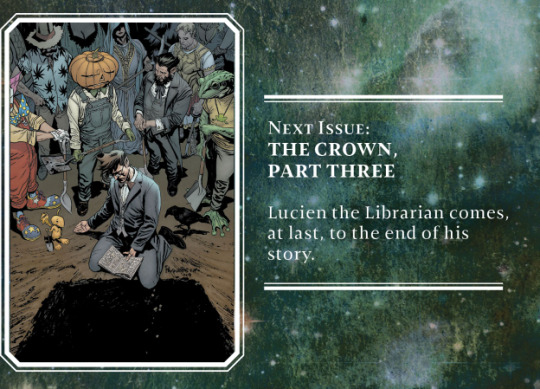
16 notes
·
View notes
Text
You can see Jason Segel in Douglas County this weekend, but not as an actor — as an author
Fans of Jason Segel will not be surprised to learn the 37-year-old actor, screenwriter and producer has a soft spot for freaks and geeks. In fact, it was NBC’s 1999 series “Freaks and Geeks” that introduced Segel to the world, along with co-stars and Judd Apatow cohorts Seth Rogen and James Franco.
That low-rated, critically acclaimed show eventually morphed into a cult-TV touchstone, but Segel has stayed busy throughout, writing and starring in big-screen comedies such as “Forgetting Sarah Marshall” and 2011’s Oscar-winning “Muppets” reboot, all while remaining firmly in the public eye through a nine-year, 208-episode run as Marshall Eriksen on the CBS sitcom “How I Met Your Mother.”
Fans might be surprised, however, to learn that Segel is also a successful author, having co-written the “Nightmares!” children’s book series with New York Times bestselling author Kristen Miller.
Their latest collaboration, “Otherworld,” was published Tuesday by Random House Children’s Books and brings Segel to the Denver Marriott South at Park Meadows at 7 p.m. on Saturday, Nov. 4, thanks to a partnership between Douglas County Libraries and The Tattered Cover.
We talked to Segel over the phone from Los Angeles on publication day about his first-ever YA novel, what compelled him to write it, and what comedies and dramas have in common.
Q: You’re far better known as an actor than as a writer. Have you gotten used to people being surprised you do that, too?
It doesn’t really come up all that much, to be honest. The only time it comes up if it someone has read the (“Nightmares!”) books.
Q: Is that refreshing in a way?
It’s been a really wonderful experience. The great thing about writing for kids, which was sort of like doing “The Muppets,” is that there’s nothing cynical about it. There’s no snarkiness attached. Parents and kids just enjoy it, so it’s actually a nice relief because the movie industry can be snarky at times.
Q: That’s an understatement. How many of these in-person author appearances have you done at book stores?
I did a round for the first release of “Nightmares!” (in 2014), and then my other experience for this type of stuff is more press tours for movies. Books are really different, and my appearances with the “Nightmares!” books kind of blew my mind.[relatedwide=true]
Q: How so?
When you’re talking about a movie or a TV show, your entire audience has had the same experience with the piece, because you’ve told them to sit back and receive your work. Whereas with a book, everyone who’s read it has had their own unique experience with it. They’re picturing it a little bit differently, and that was what was really cool about the “Nightmares!” books: kids would ask questions about their experience with the book and they all had different takeaways.
Q: Writing a book is not typically something people do for money or fun. What made you feel like you needed to do this?
Well, I really like making stuff and if I’m to describe it honestly, I have to make stuff when an idea won’t leave me alone. It starts to nag at me. I wake up thinking about it, or I’m sitting having dinner and picturing it in my mind. And at some point the alien is going to burst out of my chest. I need to release it. There are other times when I have an idea and it won’t do that, and I don’t feel a need to write it. But there are some times when I’m trying to take a month off and I’m like, “Oh no, this idea!” I let the ideas be in charge.
Q: This is your fifth book with Kristen Miller. Can you describe what each of you brings to the process?
My experience is entirely in writing screenplays, and the real focus of a screenplay is story and dialogue and that’s what I’m good at. All of the prose in a screenplay is much more of a blueprint for filming, and that part of my writing is not really heavily developed. Kristen is amazing at it. She’s like a landscape painter when it comes to writing these books. She can picture everything perfectly.
Q: And at this point I’d imagine you have a pretty good system for collaborating.
Our senses of humor have sort of melded. There are times when I’ll read something she’s written and I’ll think, “Wait a minute, that’s a Jason Segel joke,” and vice versa.
Q: What translates for you from screenwriting to literature?
The best writing advice I ever got was from Judd (Apatow) when I was writing “Forgetting Sarah Marshall.” He said, “Write a drama. That’s what is going to keep people interested for an hour and a half. We can layer comedy on top of that, but what draws people into this is the real drama between characters.” So that’s always our focus going in. This is a sci-fi, not comedy, but you can layer all the cool stuff on top after you’ve got your story.
Q: Is it tough finding the right tone for a YA book? Most YA fiction these days seems like the script for a prestige-TV drama — cursing, sexuality, violence — and yet you have to find a way to make it PG-13.
When I’m writing I’m using a big part of my acting brain, so I’m not thinking so much in terms of genre. I’m thinking in terms of character more than anything else, and I sort of zero in on the age of characters. Our main guy, Simon, reminded me of one of the freak, in “Freaks and Geeks,” and I know that world so I just went from there. What comes from that world is some of that Holden Caulfield existential crisis, that sort of “What’s the point of all this?” kind of stuff, like David Foster Wallace light. Once I zeroed in on that, the tone became really clear to me.
Q: The general subject matter in “Otherworld” — namely, the danger of disappearing into a digital world (in this case, virtual reality) and the manipulation that can occur with that — is pretty well trod. What do you feel you and Kristen brought to it than no one else has?
The focus in our book is really on the humanity of the characters. All of these stories, from Roald Dahl books to Harry Potter to “The Matrix,” these are all about somebody. It’s the classic hero’s journey of being sucked into a world that’s not your own and finding your way out, using you own virtues to get past the threshold guardians. You are questioning what is real, and what better place to do that than virtual reality?
Q: It’s certainly a timely subject. Without giving the ending away, where do you find hope or optimism in the digital world?
The book, which is the first in a series, really grapples with the question of “What is real? How do we define reality these days?” And we use VR as a great metaphor for that, but that’s the world we’re living in now. The phenomenon of “fake news,” this Instagram life — it doesn’t do service to the complicated lives we’re living. Our lives aren’t all about beautifully staged food photos. And I think where the book arrives, and where the series will arrive on that, is that the real salvation lies in connections with another human being. Simon’s (the main character’s) best friend, and his girlfriend Kat is the only thing that’s real to him.
IF YOU GO
Jason Segel. Author in conversation and book signing for “Otherworld,” co-written with Kristen Miller. 7 p.m. Nov. 4, Denver Marriott South at Park Meadows, 10345 Park Meadows Dr. in Lone Tree. $10-$23. Adult ticket includes $10 book credit. eventbrite.com.
from Latest Information http://www.denverpost.com/2017/11/01/jason-segel-lone-tree-tattered-cover-nightmares/
1 note
·
View note
Text
You can see Jason Segel in Douglas County this weekend, but not as an actor — as an author
Fans of Jason Segel will not be surprised to learn the 37-year-old actor, screenwriter and producer has a soft spot for freaks and geeks. In fact, it was NBC’s 1999 series “Freaks and Geeks” that introduced Segel to the world, along with co-stars and Judd Apatow cohorts Seth Rogen and James Franco.
That low-rated, critically acclaimed show eventually morphed into a cult-TV touchstone, but Segel has stayed busy throughout, writing and starring in big-screen comedies such as “Forgetting Sarah Marshall” and 2011’s Oscar-winning “Muppets” reboot, all while remaining firmly in the public eye through a nine-year, 208-episode run as Marshall Eriksen on the CBS sitcom “How I Met Your Mother.”
Fans might be surprised, however, to learn that Segel is also a successful author, having co-written the “Nightmares!” children’s book series with New York Times bestselling author Kristen Miller.
Their latest collaboration, “Otherworld,” was published Tuesday by Random House Children’s Books and brings Segel to the Denver Marriott South at Park Meadows at 7 p.m. on Saturday, Nov. 4, thanks to a partnership between Douglas County Libraries and The Tattered Cover.
We talked to Segel over the phone from Los Angeles on publication day about his first-ever YA novel, what compelled him to write it, and what comedies and dramas have in common.
Q: You’re far better known as an actor than as a writer. Have you gotten used to people being surprised you do that, too?
It doesn’t really come up all that much, to be honest. The only time it comes up if it someone has read the (“Nightmares!”) books.
Q: Is that refreshing in a way?
It’s been a really wonderful experience. The great thing about writing for kids, which was sort of like doing “The Muppets,” is that there’s nothing cynical about it. There’s no snarkiness attached. Parents and kids just enjoy it, so it’s actually a nice relief because the movie industry can be snarky at times.
Q: That’s an understatement. How many of these in-person author appearances have you done at book stores?
I did a round for the first release of “Nightmares!” (in 2014), and then my other experience for this type of stuff is more press tours for movies. Books are really different, and my appearances with the “Nightmares!” books kind of blew my mind.[relatedwide=true]
Q: How so?
When you’re talking about a movie or a TV show, your entire audience has had the same experience with the piece, because you’ve told them to sit back and receive your work. Whereas with a book, everyone who’s read it has had their own unique experience with it. They’re picturing it a little bit differently, and that was what was really cool about the “Nightmares!” books: kids would ask questions about their experience with the book and they all had different takeaways.
Q: Writing a book is not typically something people do for money or fun. What made you feel like you needed to do this?
Well, I really like making stuff and if I’m to describe it honestly, I have to make stuff when an idea won’t leave me alone. It starts to nag at me. I wake up thinking about it, or I’m sitting having dinner and picturing it in my mind. And at some point the alien is going to burst out of my chest. I need to release it. There are other times when I have an idea and it won’t do that, and I don’t feel a need to write it. But there are some times when I’m trying to take a month off and I’m like, “Oh no, this idea!” I let the ideas be in charge.
Q: This is your fifth book with Kristen Miller. Can you describe what each of you brings to the process?
My experience is entirely in writing screenplays, and the real focus of a screenplay is story and dialogue and that’s what I’m good at. All of the prose in a screenplay is much more of a blueprint for filming, and that part of my writing is not really heavily developed. Kristen is amazing at it. She’s like a landscape painter when it comes to writing these books. She can picture everything perfectly.
Q: And at this point I’d imagine you have a pretty good system for collaborating.
Our senses of humor have sort of melded. There are times when I’ll read something she’s written and I’ll think, “Wait a minute, that’s a Jason Segel joke,” and vice versa.
Q: What translates for you from screenwriting to literature?
The best writing advice I ever got was from Judd (Apatow) when I was writing “Forgetting Sarah Marshall.” He said, “Write a drama. That’s what is going to keep people interested for an hour and a half. We can layer comedy on top of that, but what draws people into this is the real drama between characters.” So that’s always our focus going in. This is a sci-fi, not comedy, but you can layer all the cool stuff on top after you’ve got your story.
Q: Is it tough finding the right tone for a YA book? Most YA fiction these days seems like the script for a prestige-TV drama — cursing, sexuality, violence — and yet you have to find a way to make it PG-13.
When I’m writing I’m using a big part of my acting brain, so I’m not thinking so much in terms of genre. I’m thinking in terms of character more than anything else, and I sort of zero in on the age of characters. Our main guy, Simon, reminded me of one of the freak, in “Freaks and Geeks,” and I know that world so I just went from there. What comes from that world is some of that Holden Caulfield existential crisis, that sort of “What’s the point of all this?” kind of stuff, like David Foster Wallace light. Once I zeroed in on that, the tone became really clear to me.
Q: The general subject matter in “Otherworld” — namely, the danger of disappearing into a digital world (in this case, virtual reality) and the manipulation that can occur with that — is pretty well trod. What do you feel you and Kristen brought to it than no one else has?
The focus in our book is really on the humanity of the characters. All of these stories, from Roald Dahl books to Harry Potter to “The Matrix,” these are all about somebody. It’s the classic hero’s journey of being sucked into a world that’s not your own and finding your way out, using you own virtues to get past the threshold guardians. You are questioning what is real, and what better place to do that than virtual reality?
Q: It’s certainly a timely subject. Without giving the ending away, where do you find hope or optimism in the digital world?
The book, which is the first in a series, really grapples with the question of “What is real? How do we define reality these days?” And we use VR as a great metaphor for that, but that’s the world we’re living in now. The phenomenon of “fake news,” this Instagram life — it doesn’t do service to the complicated lives we’re living. Our lives aren’t all about beautifully staged food photos. And I think where the book arrives, and where the series will arrive on that, is that the real salvation lies in connections with another human being. Simon’s (the main character’s) best friend, and his girlfriend Kat is the only thing that’s real to him.
IF YOU GO
Jason Segel. Author in conversation and book signing for “Otherworld,” co-written with Kristen Miller. 7 p.m. Nov. 4, Denver Marriott South at Park Meadows, 10345 Park Meadows Dr. in Lone Tree. $10-$23. Adult ticket includes $10 book credit. eventbrite.com.
from Latest Information http://www.denverpost.com/2017/11/01/jason-segel-lone-tree-tattered-cover-nightmares/
1 note
·
View note
Text
You can see Jason Segel in Douglas County this weekend, but not as an actor — as an author
Fans of Jason Segel will not be surprised to learn the 37-year-old actor, screenwriter and producer has a soft spot for freaks and geeks. In fact, it was NBC’s 1999 series “Freaks and Geeks” that introduced Segel to the world, along with co-stars and Judd Apatow cohorts Seth Rogen and James Franco.
That low-rated, critically acclaimed show eventually morphed into a cult-TV touchstone, but Segel has stayed busy throughout, writing and starring in big-screen comedies such as “Forgetting Sarah Marshall” and 2011’s Oscar-winning “Muppets” reboot, all while remaining firmly in the public eye through a nine-year, 208-episode run as Marshall Eriksen on the CBS sitcom “How I Met Your Mother.”
Fans might be surprised, however, to learn that Segel is also a successful author, having co-written the “Nightmares!” children’s book series with New York Times bestselling author Kristen Miller.
Their latest collaboration, “Otherworld,” was published Tuesday by Random House Children’s Books and brings Segel to the Denver Marriott South at Park Meadows at 7 p.m. on Saturday, Nov. 4, thanks to a partnership between Douglas County Libraries and The Tattered Cover.
We talked to Segel over the phone from Los Angeles on publication day about his first-ever YA novel, what compelled him to write it, and what comedies and dramas have in common.
Q: You’re far better known as an actor than as a writer. Have you gotten used to people being surprised you do that, too?
It doesn’t really come up all that much, to be honest. The only time it comes up if it someone has read the (“Nightmares!”) books.
Q: Is that refreshing in a way?
It’s been a really wonderful experience. The great thing about writing for kids, which was sort of like doing “The Muppets,” is that there’s nothing cynical about it. There’s no snarkiness attached. Parents and kids just enjoy it, so it’s actually a nice relief because the movie industry can be snarky at times.
Q: That’s an understatement. How many of these in-person author appearances have you done at book stores?
I did a round for the first release of “Nightmares!” (in 2014), and then my other experience for this type of stuff is more press tours for movies. Books are really different, and my appearances with the “Nightmares!” books kind of blew my mind.[relatedwide=true]
Q: How so?
When you’re talking about a movie or a TV show, your entire audience has had the same experience with the piece, because you’ve told them to sit back and receive your work. Whereas with a book, everyone who’s read it has had their own unique experience with it. They’re picturing it a little bit differently, and that was what was really cool about the “Nightmares!” books: kids would ask questions about their experience with the book and they all had different takeaways.
Q: Writing a book is not typically something people do for money or fun. What made you feel like you needed to do this?
Well, I really like making stuff and if I’m to describe it honestly, I have to make stuff when an idea won’t leave me alone. It starts to nag at me. I wake up thinking about it, or I’m sitting having dinner and picturing it in my mind. And at some point the alien is going to burst out of my chest. I need to release it. There are other times when I have an idea and it won’t do that, and I don’t feel a need to write it. But there are some times when I’m trying to take a month off and I’m like, “Oh no, this idea!” I let the ideas be in charge.
Q: This is your fifth book with Kristen Miller. Can you describe what each of you brings to the process?
My experience is entirely in writing screenplays, and the real focus of a screenplay is story and dialogue and that’s what I’m good at. All of the prose in a screenplay is much more of a blueprint for filming, and that part of my writing is not really heavily developed. Kristen is amazing at it. She’s like a landscape painter when it comes to writing these books. She can picture everything perfectly.
Q: And at this point I’d imagine you have a pretty good system for collaborating.
Our senses of humor have sort of melded. There are times when I’ll read something she’s written and I’ll think, “Wait a minute, that’s a Jason Segel joke,” and vice versa.
Q: What translates for you from screenwriting to literature?
The best writing advice I ever got was from Judd (Apatow) when I was writing “Forgetting Sarah Marshall.” He said, “Write a drama. That’s what is going to keep people interested for an hour and a half. We can layer comedy on top of that, but what draws people into this is the real drama between characters.” So that’s always our focus going in. This is a sci-fi, not comedy, but you can layer all the cool stuff on top after you’ve got your story.
Q: Is it tough finding the right tone for a YA book? Most YA fiction these days seems like the script for a prestige-TV drama — cursing, sexuality, violence — and yet you have to find a way to make it PG-13.
When I’m writing I’m using a big part of my acting brain, so I’m not thinking so much in terms of genre. I’m thinking in terms of character more than anything else, and I sort of zero in on the age of characters. Our main guy, Simon, reminded me of one of the freak, in “Freaks and Geeks,” and I know that world so I just went from there. What comes from that world is some of that Holden Caulfield existential crisis, that sort of “What’s the point of all this?” kind of stuff, like David Foster Wallace light. Once I zeroed in on that, the tone became really clear to me.
Q: The general subject matter in “Otherworld” — namely, the danger of disappearing into a digital world (in this case, virtual reality) and the manipulation that can occur with that — is pretty well trod. What do you feel you and Kristen brought to it than no one else has?
The focus in our book is really on the humanity of the characters. All of these stories, from Roald Dahl books to Harry Potter to “The Matrix,” these are all about somebody. It’s the classic hero’s journey of being sucked into a world that’s not your own and finding your way out, using you own virtues to get past the threshold guardians. You are questioning what is real, and what better place to do that than virtual reality?
Q: It’s certainly a timely subject. Without giving the ending away, where do you find hope or optimism in the digital world?
The book, which is the first in a series, really grapples with the question of “What is real? How do we define reality these days?” And we use VR as a great metaphor for that, but that’s the world we’re living in now. The phenomenon of “fake news,” this Instagram life — it doesn’t do service to the complicated lives we’re living. Our lives aren’t all about beautifully staged food photos. And I think where the book arrives, and where the series will arrive on that, is that the real salvation lies in connections with another human being. Simon’s (the main character’s) best friend, and his girlfriend Kat is the only thing that’s real to him.
IF YOU GO
Jason Segel. Author in conversation and book signing for “Otherworld,” co-written with Kristen Miller. 7 p.m. Nov. 4, Denver Marriott South at Park Meadows, 10345 Park Meadows Dr. in Lone Tree. $10-$23. Adult ticket includes $10 book credit. eventbrite.com.
from News And Updates http://www.denverpost.com/2017/11/01/jason-segel-lone-tree-tattered-cover-nightmares/
0 notes
Text
You can see Jason Segel in Douglas County this weekend, but not as an actor — as an author
Fans of Jason Segel will not be surprised to learn the 37-year-old actor, screenwriter and producer has a soft spot for freaks and geeks. In fact, it was NBC’s 1999 series “Freaks and Geeks” that introduced Segel to the world, along with co-stars and Judd Apatow cohorts Seth Rogen and James Franco.
That low-rated, critically acclaimed show eventually morphed into a cult-TV touchstone, but Segel has stayed busy throughout, writing and starring in big-screen comedies such as “Forgetting Sarah Marshall” and 2011’s Oscar-winning “Muppets” reboot, all while remaining firmly in the public eye through a nine-year, 208-episode run as Marshall Eriksen on the CBS sitcom “How I Met Your Mother.”
Fans might be surprised, however, to learn that Segel is also a successful author, having co-written the “Nightmares!” children’s book series with New York Times bestselling author Kristen Miller.
Their latest collaboration, “Otherworld,” was published Tuesday by Random House Children’s Books and brings Segel to the Denver Marriott South at Park Meadows at 7 p.m. on Saturday, Nov. 4, thanks to a partnership between Douglas County Libraries and The Tattered Cover.
We talked to Segel over the phone from Los Angeles on publication day about his first-ever YA novel, what compelled him to write it, and what comedies and dramas have in common.
Q: You’re far better known as an actor than as a writer. Have you gotten used to people being surprised you do that, too?
It doesn’t really come up all that much, to be honest. The only time it comes up if it someone has read the (“Nightmares!”) books.
Q: Is that refreshing in a way?
It’s been a really wonderful experience. The great thing about writing for kids, which was sort of like doing “The Muppets,” is that there’s nothing cynical about it. There’s no snarkiness attached. Parents and kids just enjoy it, so it’s actually a nice relief because the movie industry can be snarky at times.
Q: That’s an understatement. How many of these in-person author appearances have you done at book stores?
I did a round for the first release of “Nightmares!” (in 2014), and then my other experience for this type of stuff is more press tours for movies. Books are really different, and my appearances with the “Nightmares!” books kind of blew my mind.[relatedwide=true]
Q: How so?
When you’re talking about a movie or a TV show, your entire audience has had the same experience with the piece, because you’ve told them to sit back and receive your work. Whereas with a book, everyone who’s read it has had their own unique experience with it. They’re picturing it a little bit differently, and that was what was really cool about the “Nightmares!” books: kids would ask questions about their experience with the book and they all had different takeaways.
Q: Writing a book is not typically something people do for money or fun. What made you feel like you needed to do this?
Well, I really like making stuff and if I’m to describe it honestly, I have to make stuff when an idea won’t leave me alone. It starts to nag at me. I wake up thinking about it, or I’m sitting having dinner and picturing it in my mind. And at some point the alien is going to burst out of my chest. I need to release it. There are other times when I have an idea and it won’t do that, and I don’t feel a need to write it. But there are some times when I’m trying to take a month off and I’m like, “Oh no, this idea!” I let the ideas be in charge.
Q: This is your fifth book with Kristen Miller. Can you describe what each of you brings to the process?
My experience is entirely in writing screenplays, and the real focus of a screenplay is story and dialogue and that’s what I’m good at. All of the prose in a screenplay is much more of a blueprint for filming, and that part of my writing is not really heavily developed. Kristen is amazing at it. She’s like a landscape painter when it comes to writing these books. She can picture everything perfectly.
Q: And at this point I’d imagine you have a pretty good system for collaborating.
Our senses of humor have sort of melded. There are times when I’ll read something she’s written and I’ll think, “Wait a minute, that’s a Jason Segel joke,” and vice versa.
Q: What translates for you from screenwriting to literature?
The best writing advice I ever got was from Judd (Apatow) when I was writing “Forgetting Sarah Marshall.” He said, “Write a drama. That’s what is going to keep people interested for an hour and a half. We can layer comedy on top of that, but what draws people into this is the real drama between characters.” So that’s always our focus going in. This is a sci-fi, not comedy, but you can layer all the cool stuff on top after you’ve got your story.
Q: Is it tough finding the right tone for a YA book? Most YA fiction these days seems like the script for a prestige-TV drama — cursing, sexuality, violence — and yet you have to find a way to make it PG-13.
When I’m writing I’m using a big part of my acting brain, so I’m not thinking so much in terms of genre. I’m thinking in terms of character more than anything else, and I sort of zero in on the age of characters. Our main guy, Simon, reminded me of one of the freak, in “Freaks and Geeks,” and I know that world so I just went from there. What comes from that world is some of that Holden Caulfield existential crisis, that sort of “What’s the point of all this?” kind of stuff, like David Foster Wallace light. Once I zeroed in on that, the tone became really clear to me.
Q: The general subject matter in “Otherworld” — namely, the danger of disappearing into a digital world (in this case, virtual reality) and the manipulation that can occur with that — is pretty well trod. What do you feel you and Kristen brought to it than no one else has?
The focus in our book is really on the humanity of the characters. All of these stories, from Roald Dahl books to Harry Potter to “The Matrix,” these are all about somebody. It’s the classic hero’s journey of being sucked into a world that’s not your own and finding your way out, using you own virtues to get past the threshold guardians. You are questioning what is real, and what better place to do that than virtual reality?
Q: It’s certainly a timely subject. Without giving the ending away, where do you find hope or optimism in the digital world?
The book, which is the first in a series, really grapples with the question of “What is real? How do we define reality these days?” And we use VR as a great metaphor for that, but that’s the world we’re living in now. The phenomenon of “fake news,” this Instagram life — it doesn’t do service to the complicated lives we’re living. Our lives aren’t all about beautifully staged food photos. And I think where the book arrives, and where the series will arrive on that, is that the real salvation lies in connections with another human being. Simon’s (the main character’s) best friend, and his girlfriend Kat is the only thing that’s real to him.
IF YOU GO
Jason Segel. Author in conversation and book signing for “Otherworld,” co-written with Kristen Miller. 7 p.m. Nov. 4, Denver Marriott South at Park Meadows, 10345 Park Meadows Dr. in Lone Tree. $10-$23. Adult ticket includes $10 book credit. eventbrite.com.
from News And Updates http://www.denverpost.com/2017/11/01/jason-segel-lone-tree-tattered-cover-nightmares/
0 notes